CatholicU’s Special Collections includes rare books, museum, university archives, and manuscripts. University archives and manuscripts, the latter donations of non-university institutional records and personal papers, document the American Catholic experience from education and labor to politics and social justice, including secular and canon (church) law, which often overlap. University archives include three sets of record groups relating to secular or canon law. These by nature are sensitive with restrictions, generally fifty years, and permanent for case files or personnel records, although access can be requested via the university administration. The first is the Office of the General Counsel, documenting university legal history, including property transactions. The second is the law school founded at CatholicU (1897) and the separate Columbus University Law School (1922), with the two later merging on campus. The third is the School of Canon Law, whose centenary we covered in a recent blog post.
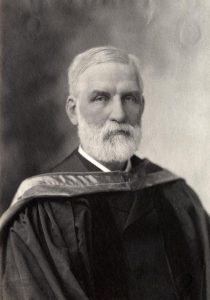
Other institutional Records or Manuscripts Collections
There are three non-institutional legal history donors, The Sisters of Life, the Thomas More Society of America, and the United States Conference of Catholic Bishops (USSC).
Sisters of Life:
Pro-Life materials donated by The Sisters of Life of New York were formerly part of their archives now concentrated at Harvard’s Schlesinger Women’s History Library. The Sisters of Life (Sorores Vitae), a uniquely American, Roman Catholic religious institute, include sisters in Canada, Australia, Ireland, and the Philippines. The collections at CatholicU include the Abortion Parental Consent Legal Research Case Files from the University of St. Thomas Law School, Center for the Rights of the Terminally Ill Collection, The Long Island Grass Roots Pro-Life Collection, March for Life Memorabilia, National Right to Life News Complete Collection, Natural Family Planning Archival Collection, and Pro-Life Movement Newsletters and Periodicals.
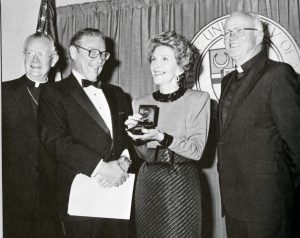
Thomas More Society of America (TMSA)
TMSA is a non-denominational organization promoting interest in Sir Thomas More (1478-1535) relevant to contemporary moral issues. They confer with lawyers, judges, and other public figures and scholarly papers are disseminated through the newsletter and The Thomas More Gazette. London native More was an internationally recognized intellectual and government figure immortalized in literature and stage as “A Man for All Seasons”. Unfortunately, he famously lost his head by defying Henry VIII, over papal rights. The Society’s annual dinner has a notable list of speakers, including Antonin Scalia (1995), Michael Novak (1993), and CatholicU president William Byron, S.J. (1983). TMSA records at CatholicU, include board of directors minutes, correspondence, financial reports, photographs, and publications.
United States Conference of Catholic Bishops (USCCB) Legal Department/General Counsel and Office of Government Relations
The USCCB was founded in 1919 as the National Catholic Welfare Council. An original department was Laws and Legislation, becoming the Legal Department (1926) and split (1966) into the Office of the General Counsel and Office of Government Relations. It represented the Bishops in litigation and promoted public speaking on policy issues affecting the Catholic Church, notably the 1920s Oregon School Case. Additionally, it recorded federal legislation provided extensive legal research and advice. Records include correspondence, publications, and subject files including education, social security, and taxation. The separate and independent Office of Government Relations records document legislative activities such as migration, religious liberty, and social justice.
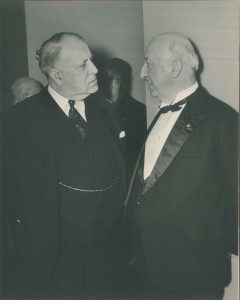
Personal Papers
The collections of personal papers include William Bentley Ball, Mary Ann Glendon, Msgr. Thomas Green, Msgr. Frederick R. McManus, William F. Montavon, Msgr. Hugh L. Motry, Rev. James H. Provost, and Judge William C. Robinson.
William Callyhan Robinson
Connecticut native Robinson (1834-1911) was a law professor, legal scholar, and judge who was also the first dean of CatholicU’s Law School. A graduate of Dartmouth College, he was a Protestant convert to Roman Catholicism who practiced law in New Haven, Connecticut, and was Dean of the Yale University Law School. He also was a prolific writer with his Notes on Elementary Law (1875), a textbook popularly used in American law schools. Bishop John Keane, rector at CatholicU, contacted Robinson in 1891 requesting he organize a school of social sciences, which would contain a department of jurisprudence that was later expanded into a law school. The Robinson Papers include his genealogy and CatholicU has a lecture series in his name.
William F. Montavon
Montavon (1874-1959), Ohio native and Notre Dame graduate, also studied at CatholicU. He was superintendent of Philippines schools, a U.S. Commercial attaché and oil executive in South America, and thereafter (1925-1951) director of the NCWC Legal Department (now Office of the General Counsel). He accompanied Fr. John J. Burke, NCWC general secretary, and Ruiz y Flores, Archbishop of Morella, on negotiations with Mexican revolutionary leader Calles that eased religious restrictions in 1929. He was also an expert on church-state relations in Spain, traveling there as correspondent of the NCWC News Service. He was honored by the Pope as Knight Commander of the Order of St. Gregory the Great (1929) and was a member of the Knights of Columbus and the Catholic Association for International Peace. The Montavon Papers are mainly correspondence and addresses concerning the Church in Mexico and Spain.
Hugh Lewis Motry
Motry (1884-1952), a priest of Columbus, Ohio, was a CatholicU, alum, professor, and dean of Canon Law. He founded the Canon Law Society of America (CLSA) and the canonical review, The Jurist. Motry was also a Chaplain to the Army Corp of Engineers at Fort Belvoir and with the Richmond Diocese as Judge, Advocate, and Procurator. He was honored as Domestic Prelate the Pope Pius on the fortieth anniversary of his ordination. The Motry Papers includes correspondence, financial information, photographs, lecture notes, publications, and a number of Catholic University diplomas. There are also many transcripts, in both Latin and English, of Canon Law cases and doctrine.
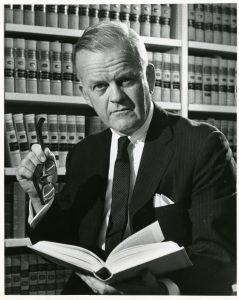
William Bentley Ball
Ball (1916-1999) attended Western Reserve University (now Case Western Reserve University), where he was President of the Young Americanist League, opposing extremist groups. He served in the U.S. Navy in World War II. Thereafter, he taught at Villanova, and was general counsel for the Pennsylvania Catholic Conference. In 1967, he worked on his first Supreme Court of the United States (SCOTUS) case, Loving v. Virginia, representing the Bishops against anti-miscegenation laws. The Pope made him Knight of the Order of St. Gregory the Great (1974) and Ball was considered for the SCOTUS associate justice seat that went to Antonin Scalia (1986). The Ball Papers, contain case files, correspondence, and photographs. Additionally, there are research materials of Bruce Dierenfield and David Gerber for their 2020 book Disability Rights and Religious Liberty in Education.
Frederick Richard McManus
McManus (1923-2005) was a respected scholar, noted canonist, and tireless liturgical reformer. The Massachusetts native served in the Archdiocese of Boston before earning degrees at CatholicU. At the latter, he was professor of canon law, Editor of The Jurist, dean of the school of canon law, and Academic Vice President. Besides these duties, he served on the Bishop’s Committee on the Liturgy and was involved with the Canon Law Society of America (CLSA) and the Second Vatican Council. In addition, he published continuously, contributing to American Ecclesiastical Review, Commonweal, The Jurist, The Living Light, and Worship. The McManus Papers include correspondence, subject files, meeting minutes, printed material, photographs, and memorabilia.
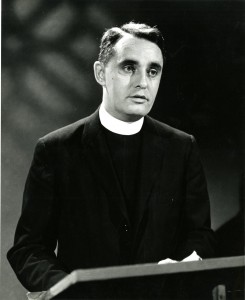
James Harrison Provost
Provost (1939-2000), priest of the Diocese of Helena and educated in Louvain and Rome, headed the Canon Law Society of America, was Canon Law Chair at CatholicU, and managing editor of the The Jurist. Provost addressed difficult questions, such as abortion, and his writings were challenged in the 1980s during his ultimately successful tenure battle at CatholicU when the Vatican criticized his assertion the Church “discriminates” against women by denying them entry to the priesthood. The Provost Papers, contain materials related to tenure review, synod, and publications.
Thomas Green
Green (1938-2018), a priest of Bridgeport specialized in penal law and published commentaries on the New Code of Canon Law (1983). Educated in Rome, he served as Bridgeport vice chancellor, then taught canon law at St. Louis University before going to CatholicU where he was Canon Law department chair as well as a consultant on the NCCB Canonical Affairs Committee and to the Board of Governors of the Canon Law Society of America. He became a Chaplain of His Holiness, with the title of Monsignor, by the Pope (1996) and also served as editor of The Jurist. The Green Papers include correspondence, reports, and publications on penal law, the revised code, and the role of women in the church.
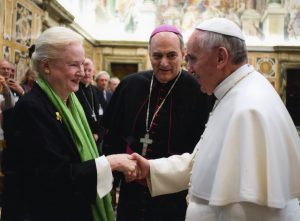
Mary Ann Glendon
Massachusetts native Glendon practiced law in Chicago and served pro bono as a volunteer defense attorney for civil rights workers in Mississippi during the Freedom Summer (1964). She was the first woman faculty of Boston College Law School and later went to Harvard, developing a public profile through her writings, including Abortion and Divorce in Western Law (1987). In 1994, the Pope appointed her to the newly formed Pontifical Academy of Social Sciences (PASS), where she served as president, 2004-2014, only the second woman to preside over a pontifical academy. Under Bush (43), she served on the U.S. President’s Council on Bioethics and was U.S. Ambassador to the Holy See. The Glendon Papers include correspondence, speeches, and photographs.
Conclusion
This diverse assemblage of collections with both institutional records and personal papers is an important resource for the canon law and secular legal history of the American Catholic Church. For more information, please contact Special Collections at CatholicU at lib-archives@cua.edu. This post is a condensed version of the recent article:
